
ChatGPT for Creative Writing: Unleashing Your Imagination in 2024
geeky-gadgets.com – Friday January 5, 2024

In 2024, the landscape of creative writing has been revolutionized by the advent and integration of advanced AI technologies, with ChatGPT at the forefront. This tool, built upon the sophisticated GPT-4 architecture, has emerged as a powerful ally for writers, poets, playwrights, and other creative professionals. Its ability to generate human-like text, brainstorm ideas, and assist in the writing process has opened new avenues for creativity and innovation in the literary world.
The Evolution of ChatGPT in Creative Writing
To appreciate ChatGPT’s role in creative writing, it’s essential to understand its evolution. Initially, AI writing tools were primarily used for generating short, formulaic text. However, as these models became more advanced, they started showing potential in aiding more complex and creative writing tasks. With the introduction of GPT-4, ChatGPT became capable of understanding and generating nuanced, contextually rich, and stylistically varied text, making it an invaluable tool for creative writers.
Understanding ChatGPT’s Capabilities
ChatGPT’s strengths lie in its ability to process and generate language in a way that closely mimics human thought and expression. Its training on a diverse range of texts enables it to offer stylistic suggestions, and narrative ideas, and even help with character development. For instance, a writer struggling with dialogue can turn to ChatGPT for examples of how a conversation between characters might flow. Moreover, its capacity to understand and emulate various writing styles allows it to provide targeted assistance, whether one is writing a hard-boiled detective story or a romantic sonnet.

Opinion: As a writer I don’t despair about AI — it can’t replicate our imaginations
latimes.com – Monday January 1, 2024

When I first encountered generative AI at a law seminar two years ago, I had the passing thought, as a novelist and critic, that it could actually be good for fiction written by humans — at least the kind of fiction I like.
Just think: Machines would potentially standardize prose in a contemporary fiction landscape that already tends to value minimalist writing, and the ease with which robots might reproduce simple sentences and formulaic plots would mean that the stylists, the eccentrics, the strangely passionate human authors would finally stand out. This optimism was quickly defeated by the realization that one of my day jobs, as a ghostwriter, would almost certainly become automated.
At my mother’s house that evening here in Northern California, I ranted about this development in a society that already devalues art and the printed word. I preached about how ridiculous it was that artificial intelligence companies and startups were creating meaningless applications that reinforce layers of racial bias and leave a heavy carbon footprint, rather than investing that money and time into, say, solutions to mass incarceration and climate change.
My mother has had a long successful career in tech and remains involved in the field of AI. She’s one of the most moral and wise humans that I know. Unfazed by my argument, she said, thoughtfully, “Yes, ChatGPT will probably change things.”
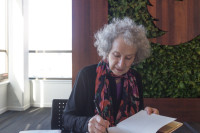
Lasting reputations: why have some authors dominated the publishing industry?
theboar.org – Sunday December 31, 2023

Life Before Man, The Cement Garden, Grimus. Whilst this may just seem like a list of books published some five decades ago, all these books have one thing in common. Their authors, who found fame in the 1970s, are still being revered for their literary efforts in 2023. Atwood, McEwan, Rushdie – all stalwarts of the “Old Gang” who are still finding their books in best-seller lists today. When so many new authors are fighting to be seen on bookshop shelves and to be promoted on social media, it may seem absurd that we are still returning to books by older authors, but nevertheless, their works have a longevity that have allowed them to continue selling thousands of copies in the 21st century, whether this seems detrimental to the literary industry or not.
The 1970s was a time of change across the literary scene. In the backdrop of a more turbulent political and social landscape, authors were honing in on a reflective style with texts encompassing an awareness of the changing world they formed a part of. The youthful voice was being captured with the emergence of upcoming authors like Toni Morrison and Martin Amis. Literature was being used as a vehicle for political and social change. Yet, ironically, the call for modernising which was ever present in the 1970s is something that is being halted today by the authors of that era outlasting many of their contemporaries.

Writers: Now Is The Time To Set Your Goals For The New Year
nofilmschool.com – Saturday December 30, 2023

As the New Year unfolds, it's a time of reflection and renewal, not just in our personal lives but also in our creative endeavors.
For writers, this period holds a unique significance. The turn of the year is an ideal moment to set intentions, to chart a course for the months ahead in their writing journey.
Every December, I sit down and make a list of what I want out of the New Year, and I think it has helped me move my career forward in wonderful ways.
So, I'm here to share that strategy with you.
Whether you're a seasoned author or just starting to dabble in the art of words, setting intentions for the New Year can be a transformative practice.
In this post, we'll delve into why it's particularly crucial for writers to set their intentions and offer practical strategies to ensure these goals are not just set but also achieved.
Let's get started.
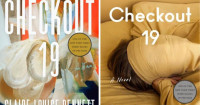
The Fine Art of the Paperback Makeover
nytimes.com – Thursday December 28, 2023

Redesign? Relaunch? Regret? Take a look at the ways publishers aimed to seduce new audiences by changing up the covers of notable books.
“You never get a second chance to make a first impression,” the humorist Will Rogers once said — which tells you he wasn’t a book publishing executive. In that world, the paperback edition is the second chance, an opportunity to market a book at a lower price and, in many cases, with new cover imagery aimed at new audiences.
Goals can include getting big-box stores to display the book, Instagram browsers to pause before swiping, or readers to rethink what’s between those covers. “The shift in perception can be quite dramatic or quite subtle, but the energies are redirected,” says Mitzi Angel, the president and publisher of Farrar, Straus & Giroux.
Here are the stories behind eight intriguing 2023 paperbacks (and a sneak peek at the new look for Eleanor Catton’s novel “Birnam Wood,” coming in 2024), with behind-the-scenes insight into what you see — and what you may not, unless you pay close attention.
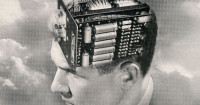
The Year That A.I. Came for Culture
newrepublic.com – Thursday December 21, 2023

The events of 2023 showed that A.I. doesn’t need to be that good in order to do damage.
This March, news broke that the latest artificial intelligence models could pass the LSAT, SAT, and AP exams. It sparked another round of A.I. panic. The machines, it seemed, were already at peak human ability. Around that time, I conducted my own, more modest test. I asked a couple of A.I. programs to “write a six-word story about baby shoes,” riffing on the famous (if apocryphal) Hemingway story. They failed but not in the way I expected. Bard gave me five words, and ChatGPT produced eight. I tried again, specifying “exactly six words,” and received eight and then four words. What did it mean that A.I. could best top-tier lawyers yet fail preschool math?
A year since the launch of ChatGPT, I wonder if the answer isn’t just what it seems: A.I. is simultaneously impressive and pretty dumb. Maybe not as dumb as the NFT apes or Zuckerberg’s Metaverse cubicle simulator, which Silicon Valley also promised would revolutionize all aspects of life. But at least half-dumb. One day A.I. passes the bar exam, and the next, lawyers are being fined for citing A.I.-invented laws. One second it’s “the end of writing,” the next it’s recommending recipes for “mosquito-repellant roast potatoes.” At best, A.I. is a mixed bag. (Since “artificial intelligence” is an intentionally vague term, I should specify I’m discussing “generative A.I.” programs like ChatGPT and MidJourney that create text, images, and audio. Credit where credit is due: Branding unthinking, error-prone algorithms as “artificial intelligence” was a brilliant marketing coup.)

Not taking “no” for an answer
niemanstoryboard.org – Thursday December 21, 2023

A freelancer persisted through multiple rejections and 17 edits to land an article in a favorite magazine
I’ve been both accepted and rejected by Nature Magazine.
For the same submission.
It all started when I met a bumblebee veterinarian at the UPOD Writer’s Conference this past January.
Some people keep a bucket list. I keep a publishing bucket list.
Nature had been on my publishing bucket list for pretty much forever. I had no real business being in Nature. I write a lot of personal, usually humorous essays for places like HuffPost and Newsweek; quirky, in-depth, forgotten-by-time pieces I call history-mysteries; culture/trend stories, including book reviews; and occasionally a health story, though not much in the sciences, and Nature is the creme de la creme of science publications.
But I had gotten smug of late, which I blame on my incongruous acceptance a month earlier of a lengthy, history-mystery piece in Smithsonian Magazine, another magazine in which I have no real business appearing. And I was an avid, almost fanatical reader, of Nature. I was particularly enamored of their short “Where I Work” pieces on the last page, which feature an interview with a scientist in a particularly unusual, sometimes bizarre, job, written in the first person. Truth to tell, I also loved it because it was the only part of the magazine I could consistently understand.)
So when we went around the room and did introductions at the writing conference, and Elizabeth Hilborn introduced herself as a veterinarian for honeybees, I immediately flashed to Nature Magazine. In my voracious readings of the “Where I Work’ column, I’d never read about a bee veterinarian or anything similar. It seemed a perfect fit.
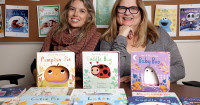
How these San Diego kids books beat out bestselling authors like James Patterson, Anderson Cooper
sandiegouniontribune.com – Saturday December 16, 2023

Silver Dolphin Books, a San Diego book imprint you’ve probably never heard of, tucked into a Sorrento Valley office park you’ve likely never driven by, is behind three of the country’s most read books. They have a profound theme: the strength of human connection. They have sold millions of copies, everywhere from Target to Costco to indie booksellers and they have millions of views on TikTok.
Two of those titles just beat James Patterson, Barbara Kingsolver and Anderson Cooper on USA Today’s Best-selling Booklist.
Their target audience: babies. Sample titles: “You’re My Little Baby Boo,” “You’re My Little Pumpkin Pie,” and the book that started it all, “You’re My Little Cuddle Bug.”
If you are familiar with the “You’re My Little” book series, then you know exactly why tiny humans and their parents love them. If you are not, here is a quick primer: These are board books (with thicker pages) designed for kids under three about all sorts of babies (ghosts, butterflies, pumpkin pies) and their parents or caregivers. The pages have smooth cutout shapes perfect for fat little fingers to grab. The rhymes are easy. The illustrations are adorable — think the roundest eyes and rosiest cheeks and the smiliest smiles. Each book delivers a heartwarming message in about 100 words.
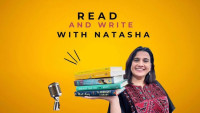
The ten-minute writing sprint is life-changing
jordannews.jo – Tuesday December 12, 2023

I now work on my fiction every day, even for only 10 minutes, and the words add up
I first heard about the ten-minute writing sprint concept during my podcast conversation with indie author Doug Weissman.
I was curious about this approach, so I tried it
Suffice to say, it has been life-changing.
I now work on my fiction every day, even for only 10 minutes, and the words add up, making me feel happy and accomplished.
Take that, procrastination!

Three Short Story Writers On Publishing and Crafting Their Debut Collections
electricliterature.com – Tuesday December 12, 2023

The short story is an entirely different pleasure than the novel. For writers, the form demands precision and intense scrutiny of craft choices. The short story is constrained by its brevity but remains limitless in the opportunities it presents to challenge notions of craft. The short story collection, then, is an art form in and of itself. In conversation, stories produce something new and thrilling. We are let in to linger and marvel at the writer’s world, to listen to its chorus of voices telling us something urgent.
This interview features three writers who published their debut short story collections this year: Ada Zhang, the author of The Sorrows of Others; Nishanth Injam, the author of The Best Possible Experience; and Alexandra Chang, the author of Tomb Sweeping. I called Zhang, Injam, and Chang to learn about their writing processes, relationships with the short story form, and experiences publishing their first collections.
Get the free newsletter | Submit a news item or article | Get Writers' News for your website





